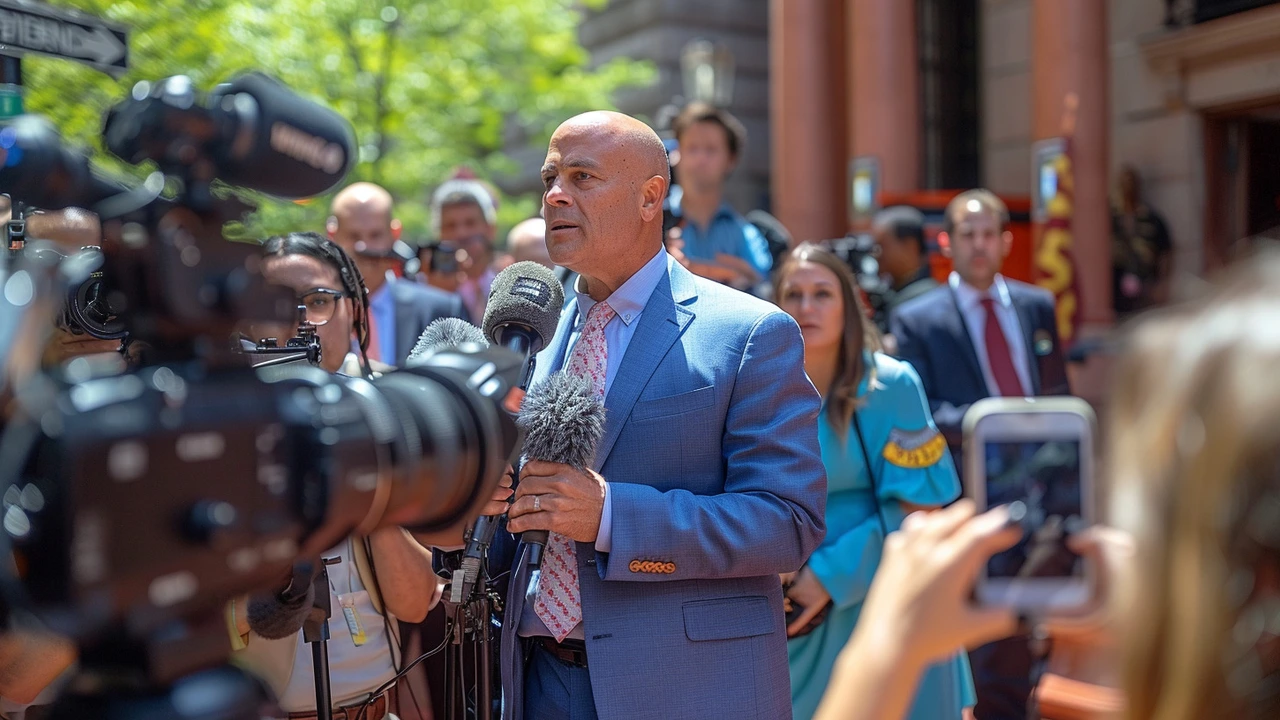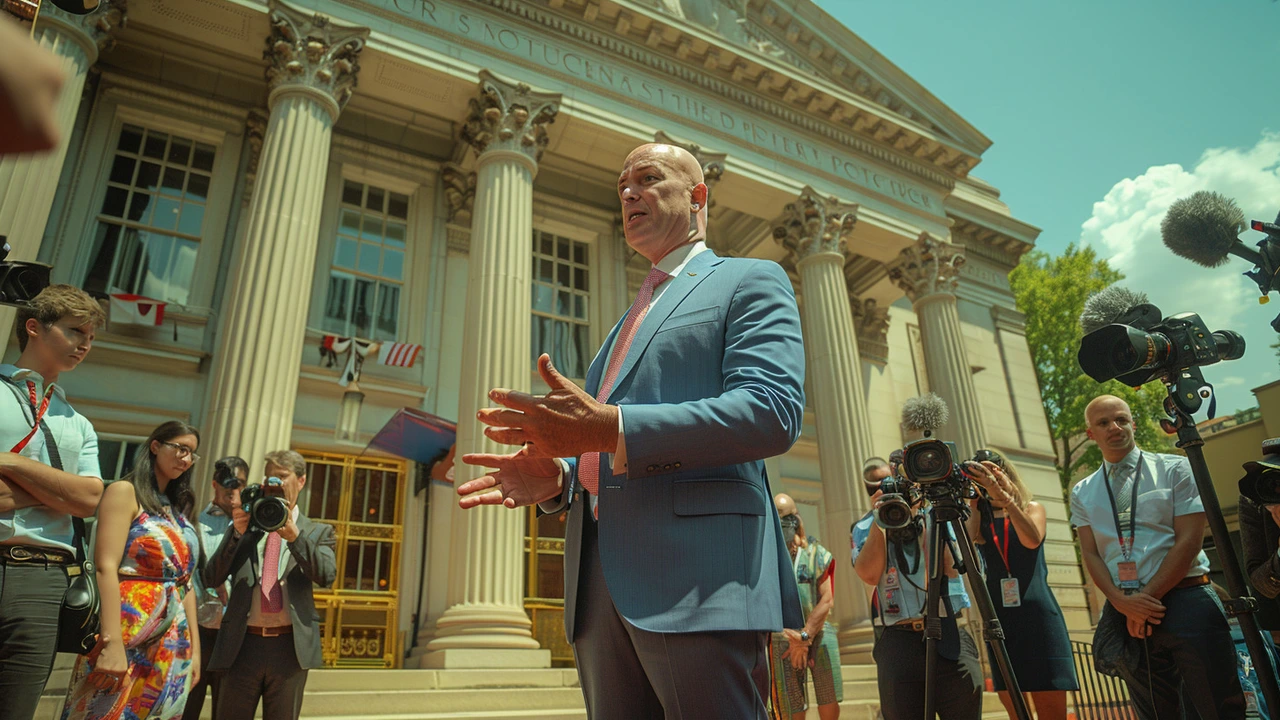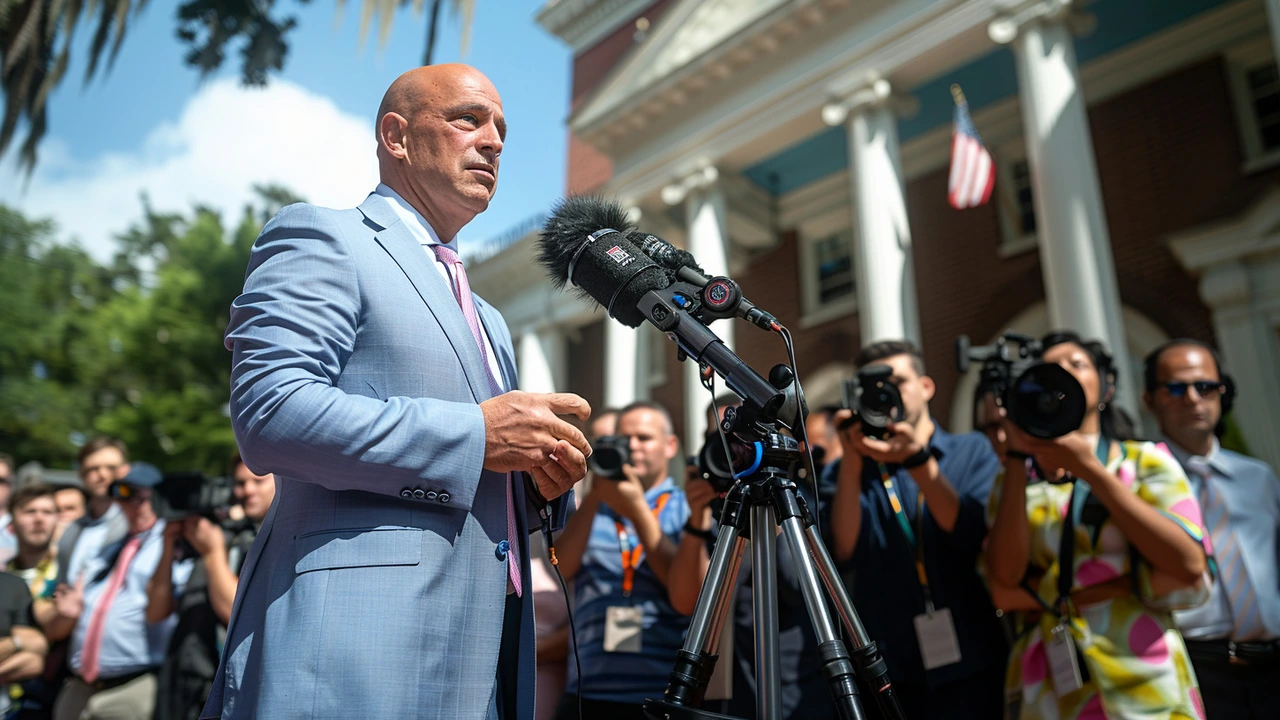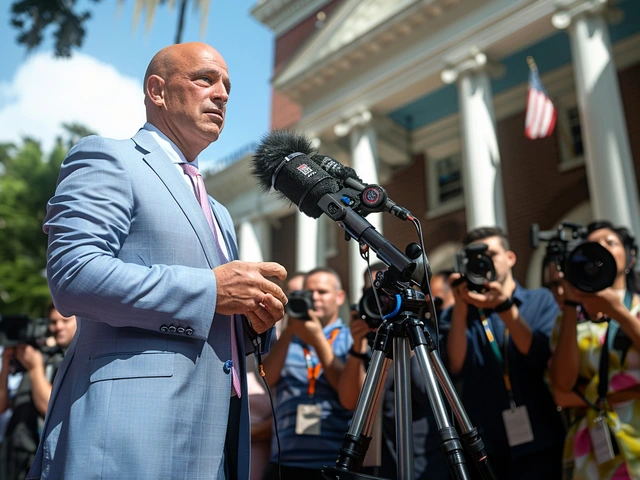The Arrest Incident and Legal Fallout
During the high-profile PGA Championship, professional golfer Scottie Scheffler found himself in an unexpected predicament. The incident that unfolded led to his arrest by Detective Bryan Gillis of the Louisville police. The situation became a highly debated topic, intertwined with legal implications and public scrutiny. Gillis released a statement criticizing Scheffler's attorney, Steve Romines, for alleging that Scheffler had been 'falsely arrested' without full consideration of the facts. But the story delves deeper than mere accusations and rebuttals.
Gillis, in his statement, mentioned that he suffered a few injuries during the arrest, highlighting visible damage to his knees and wrist when Scheffler's car allegedly dragged him to the ground. Despite these injuries, Gillis made it clear that he holds 'no ill will' toward Scheffler and even offered his best wishes to the golfer and his family. This gesture was a striking counterpoint to the more contentious remarks directed toward the legal counsel.
Implications for Scottie Scheffler
The arrest resulted in significant media attention, raising questions about the legality and fairness of law enforcement actions. Jefferson County Attorney Mike O'Connell examined the case thoroughly before deciding to drop the charges against Scheffler. According to O'Connell, the decision was backed by evidence that supported Scheffler's narrative of a misunderstanding with the officer. This crucial detail helped pivot the arrest from a potential legal battle into a case of mistaken intentions.
Attorney Steve Romines initially indicated that Scheffler had valid grounds for a civil suit but eventually stated that the golfer did not wish to pursue any litigation. This choice may have been driven by Scheffler's desire to shift focus back to his professional career and personal life, thus bringing a sense of closure to an incident that had already attracted substantial public curiosity and media coverage.

The Unseen Video
Adding another layer to this intricate story, a new video surfaced showing Scheffler being interviewed by another police officer. In this footage, Scheffler admitted to not stopping and getting impatient due to being late for his tee time. This candid acknowledgment highlighted the stress and urgency Scheffler felt, possibly leading to the hasty actions that culminated in the arrest.
In the same video, Scheffler described the officer's actions as overly aggressive, suggesting that the situation could have been diffused more calmly. The footage thus painted a more nuanced picture, presenting both sides of the story and inviting the public to gauge the incident's complexity.
Discipline and Future Transparency
Detective Gillis faced disciplinary action for an oversight that further complicated the case: he did not activate his body camera during the arrest. This procedural lapse led to questions about transparency and accountability within the police department. The absence of crucial footage during the arrest created a gap in the narrative that could have provided a clearer understanding of the incident.
In response to the unfolding events, the Louisville police department announced plans to release additional videos and documents related to the case. This commitment to transparency is aimed at offering a more comprehensive view of what transpired, allowing the public, and potentially legal experts, to make informed assessments.

Public and Professional Reactions
The arrest and subsequent fallout sparked widespread reactions across different communities. Within the golfing world, many expressed empathy towards Scheffler, understanding the intense pressure that comes with high-stakes tournaments. Fans and fellow golfers rallied around him, hoping the incident would not overshadow his budding career.
On the other hand, law enforcement and legal professionals debated the nuances of the case, from the appropriate levels of police intervention to the legal grounds for arrest. The exchange between Gillis and Romines became a proxy for a larger discussion about legal ethics, police conduct, and the fine line between lawful authority and overreach.
The story of Scottie Scheffler's arrest at the PGA Championship serves as a poignant reminder of how easily misunderstandings can escalate. It sheds light on the importance of accountability, transparency, and empathy from all parties involved. As more information comes to light, the hope is that similar incidents in the future can be avoided through better communication and procedural diligence.



Comments
Well, isn’t this just another classic case of the police drama saga? Detective Gillis playing the sympathetic hero while pointing fingers at an attorney – it's practically a Shakespearean tragedy, only with more handcuffs and less poetry. The whole thing reeks of overblown theatrics, yet somehow still manages to keep the media glued like it’s reality TV.
Meanwhile, poor Scheffler probably wishes he could just hit a perfect drive instead of dodging headlines.
Honestly, this whole thing felt like watching a low‑budget police show – the plot twists are about as subtle as a neon sign. Gillis’ injuries? Sure, we get it, but the drama could use a better script.
Let us dissect the layers of jurisdictional overreach and procedural missteps that culminate in this spectacle. First, the arrest occurred amid a high‑stakes sporting event, a context where traffic flow and timeliness are paramount, yet the officer opted for an aggressive approach that arguably violated proportionality doctrine. Second, the failure to activate a body‑camera nullifies the evidentiary chain, a lapse that erodes public trust and emboldens claims of selective enforcement. Third, the subsequent statements from Detective Gillis, while expressing no ill will, paradoxically amplify a narrative of victimization that the officer himself purportedly endured. Fourth, the attorney’s pivot from a potential civil claim to a non‑litigious resolution reflects a strategic retreat, potentially driven by reputational calculus rather than pure legal merit. Fifth, the district attorney’s decision to drop charges pivots on evidentiary insufficiency, underscoring the necessity of transparent investigative protocols. Sixth, the emergent video footage, wherein Scheffler admits to impatience, adds a nuanced human factor that neither absolves nor condemns, but rather illustrates the fractious interface between sport schedule pressures and law enforcement discretion. Seventh, the disciplinary action against Gillis for the body‑camera omission flags systemic deficiencies in accountability mechanisms that demand rectification. Eighth, the police department’s pledge to release further documentation signals a reactive transparency, yet it simultaneously advertises an admission of prior opacity.
Collectively, these elements compose a case study in how procedural oversights, media amplification, and legal maneuvering intersect to produce a public relations quagmire. The lesson, arguably, is that institutions must embed robust checks, embrace full‑fidelity recording practices, and cultivate communication channels that preempt escalation, especially when the stakes involve both public figures and pervasive public interest.
Wow, another glorified lecture on procedural minutiae. Let’s be real: Gillis isn’t some saint, he’s a cop who chose to dramatize a simple traffic stop. The so‑called "transparency" is just a PR stunt. The body‑cam omission? Classic rookie move, not a systemic failure. Everyone’s gasping over a golf star’s tardiness while the real story is a police officer trying to look important.
Ah, the sweet symphony of over‑the‑top dramatics! One could almost hear a violin swell each time the officer pretends to be wounded, while our dear Scheffler merely chases a tee time like a common mortal. And yet, the police department, ever the beacon of modesty, offers its "best wishes" as if that absolves any procedural faux pas. Truly, a masterpiece of humility and self‑congratulation.
From a procedural standpoint, the lack of body‑camera footage significantly hampers objective assessment. Transparent documentation is essential for both public confidence and internal review. It would be beneficial for departments to enforce automatic activation policies during any citizen encounter to avoid similar gaps.
It is quite astonishing how this situation escalated. The legal implications are numerous but the core issue remains simple – a missed tee time.
Sure, let’s all bow to the great authority of a missed tee time. In the grand tapestry of life, a golf schedule outweighs civil liberties, apparently.
Honestly! The moral calculus here is as tangled as a knot of golf tees! Scheffler’s haste is no excuse for a police overreach! One must ask: do we value a punctual tee over the sanctity of due process? The answer, dear readers, flashes like a neon sign of justice! Yet the officer’s injuries are painted as martyrdom – a narrative that flies in the face of rational empathy! Let us not be seduced by melodrama; let reason prevail!!
Oh great, another drama about a guy who was late. Police officer gets hurt, lawyer blabs, and we all pretend it’s a big deal. Yeah, right.
Enough of the sarcasm. This is about accountability. Whether you care about a missed tee or not, the officer’s failure to record the encounter undermines trust. We need consistent standards, not fanciful excuses.
Let us view this incident as an opportunity for collective growth. By embracing transparent practices and reinforcing procedural discipline, both law enforcement and athletes can move forward with renewed confidence and mutual respect.
When we examine the cultural substratum of this saga, we uncover a collision between institutional authority and individual ambition. The police narrative, steeped in traditional enforcement archetypes, meets the modern athlete’s drive for performance excellence. This dialectic invites a broader philosophical dialogue about power, legitimacy, and the social contract that binds disparate realms of public life.
Wow, what a wild ride! 😄
From a stakeholder‑centric perspective, the incident underscores the necessity for integrated risk mitigation frameworks that align operational protocols with legal compliance mandates. The omission of body‑camera activation triggers a cascade of evidentiary gaps, complicating both prosecutorial discretion and civil litigation pathways. Moreover, the interplay between media amplification and reputational risk management demands a calibrated communications strategy that balances transparency with privacy considerations. In essence, institutions must adopt a holistic governance model that leverages cross‑functional expertise to preemptively address such contingencies.